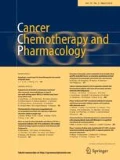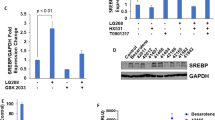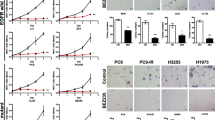Abstract
Purpose
Erlotinib, a small molecule inhibitor of the tyrosine kinase (TK) domain of epidermal growth factor receptor (EGFR), increases survival of advanced non-small cell lung cancer patients who failed standard chemotherapy (Phase III study). We evaluated whether erlotinib is also effective at an early stage of primary lung tumorigenesis in a carcinogen-induced lung tumor model in mice.
Methods
Sixteen weeks after carcinogen (urethane) injection, when small self-contained adenomas are evident, male and female A/J mice were treated IP with 10 mg/kg erlotinib or Captisol vehicle daily over 3.5 weeks (15 mice per group). The efficacy, metabolism and mechanism of action of erlotinib were evaluated.
Results
Erlotinib reduced tumor burden in males by twofold compared to vehicle (12.7 ± 1.2 vs 26.2 ± 2.5 mg, respectively; p < 0.0001), while tumor burden in erlotinib-treated females slightly increased compared to vehicle by 21% (15.1 ± 1.2 vs 11.9 ± 0.9 mg, respectively; p < 0.05). Tumor multiplicity, in contrast, was unaffected by erlotinib. The levels of erlotinib that accumulated in plasma, lung tumor tissue and adjacent uninvolved (UI) lung were comparable in males and females. Males, however, accumulated more OSI-420, an active and pharmacologically equipotent metabolite of erlotinib, than females in plasma, lung tumors, and UI lung. In both genders, 80% of tumors contained Kras mutations at codon 61, but no EGFR mutations were detected. The cellular distribution and concentration of EGFR were also similar between genders. In control mice, however, phosphorylated EGFR (pEGFR) levels were nearly 2.5-fold higher in males compared to females in UI lungs and sevenfold higher in lung tumors. Further, erlotinib decreased the contents of pEGFR in UI lungs and lung tumors, particularly in males.
Conclusions
Adenomas from male mice in this early lung cancer model are responsive to erlotinib treatment, possibly because of a greater dependence of male tumor growth on the EGFR pathway compared to females. Importantly, these results indicate that small lung adenomas from male mice that utilize EGFR signaling but also harbor Kras mutations shrink in response to erlotinib, suggesting that erlotinib may be beneficial for some patients very early during lung cancer progression.








Similar content being viewed by others
References
Parkin DM, Bray F, Ferlay J, Pisani P (2005) Global statistics, 2002. CA Cancer J Clin 55(2):74–108
American Cancer Society (2007) Cancer facts and figures 2007. American Cancer Society, Atlanta
Hirsch FR, Varella-Garcia M, Bunn PA, Di Maria MV, Veve R, Bremnes RM, Baron AE, Zeng C, Franklin WA (2003) Epidermal growth factor receptor in non-small-cell lung carcinomas: correlation between gene copy number and protein expression and impact on prognosis. J Clin Oncol 21:3798–3807
Arteaga CL (2002) Epidermal growth factor receptor dependence in human tumors: more than just expression? Oncologist 7(Suppl 4):31–39
Brabender J, Danenberg KD, Metzger R, Schneider PM, Park J, Salonga D, Holscher AH, Danenberg PV (2001) Epidermal growth factor receptor and HER2-neu mRNA expression in non-small cell lung cancer is correlated with survival. Clin Cancer Res 7:1850–1855
Yarden Y, Sliwkowski MX (2001) Untangling the ErbB signalling network. Nat Rev Mol Cell Biol 2:127–137
Jorissen RN, Walker F, Pouliot N, Garrett TP, Ward CW, Burgess AW (2003) Epidermal growth factor receptor: mechanisms of activation and signalling. Exp Cell Res 284:31–53
Pao W, Miller VA (2005) Epidermal growth factor receptor mutations, small-molecule kinase inhibitors, and non-small-cell lung cancer: current knowledge and future directions. J Clin Oncol 23:2556–2568
Hynes NE, Lane HA (2005) ERBB receptors and cancer: the complexity of targeted inhibitors. Nat Rev Cancer 5:341–354
Ono M, Kuwano M (2006) Molecular mechanisms of epidermal growth factor receptor (EGFR) activation and response to gefitinib and other EGFR-targeting drugs. Clin Cancer Res 12:7242–7251
Herbst RS, Bunn PA Jr (2006) Targeting the epidermal growth factor receptor in non-small cell lung cancer. Clin Cancer Res 9:5813–5824
Ciardiello F, De Vita F, Orditura M, Tortora G (2004) The role of EGFR inhibitors in non small cell lung cancer. Curr Opinion Oncol 16:130–135
Shepherd FA, Pereira JR, Ciuleanu T, Tan EH, Hirsh V, Thongprasert S, Campos D, Maoleekoonpiroj S, Smylie M, Martins R, van Kooten M, Dediu M, Findlay B, Tu DS, Johnston D, Bezjak A, Clark G, Santabarbara P, Seymour L (2005) Erlotinib in previously treated non-small-cell lung cancer. New Engl J Med 353:123–132
Kris MG, Natale RB, Herbst RS, Lynch TJ, Prager D, Belani CP, Schiller JH, Kelly K, Spiridonidis H, Sandler A, Albain KS, Cella D, Wolf MK, Averbuch SD, Ochs JJ, Kay AC (2003) Efficacy of gefitinib, an inhibitor of the epidermal growth factor receptor tyrosine kinase, in symptomatic patients with non-small cell lung cancer—a randomized trial. JAMA 290:2149–2158
Lynch TJ, Bell DW, Sordella R, Gurubhagavatula S, Okimoto RA, Brannigan BW, Harris PL, Haserlat SM, Supko JG, Haluska FG, Louis DN, Christiani DC, Settleman J, Haber DA (2004) Activating mutations in the epidermal growth factor receptor underlying responsiveness of non-small-cell lung cancer to gefitinib. New Engl J Med 350:2129–2139
Paez JG, Janne PA, Lee JC, Tracy S, Greulich H, Gabriel S, Herman P, Kaye FJ, Lindeman N, Boggon TJ, Naoki K, Sasaki H, Fujii Y, Eck MJ, Sellers WR, Johnson BE, Meyerson M (2004) EGFR mutations in lung cancer: correlation with clinical response to gefitinib therapy. Science 304:1497–1500
Sharma SV, Bell DW, Settleman J, Haber DA (2007) Epidermal growth factor receptor mutations in lung cancer. Nat Rev Cancer 7:169–181
Pao W, Wang TY, Riely GJ, Miller VA, Pan QL, Ladanyi M, Zakowski MF, Heelan RT, Kris MG, Varmus HE (2005) KRAS mutations and primary resistance of lung adenocarcinomas to gefitinib or erlotinib. PLOS Med 2:57–61
Eberhard DA, Johnson BE, Amler LC, Goddard AD, Heldens SL, Herbst RS, Ince WL, Janne PA, Januario T, Johnson DH, Klein P, Miller VA, Ostland MA, Ramies DA, Sebisanovic D, Stinson JA, Zhang YR, Seshagiri S, Hillan KJ (2005) Mutations in the epidermal growth factor receptor and in KRAS are predictive and prognostic indicators in patients with non-small-cell lung cancer treated with chemotherapy alone and in combination with erlotinib. J Clin Oncol. 23:5900–5909
Cappuzzo F, Hirsch FR, Rossi E, Bartolini S, Ceresoli GL, Bemis L, Haney J, Witta S, Danenberg K, Domenichini I, Ludovini V, Magrini E, Gregorc V, Doglioni C, Sidoni A, Tonato M, Franklin WA, Crino L, Bunn PA Jr, Varella-Garcia M (2005) Epidermal growth factor receptor gene and protein and gefitinib sensitivity in non-small-cell lung cancer. J Natl Cancer Inst 97:643–655
Tsao MS, Sakurada A, Cutz JC, Zhu CQ, Kamel-Reid S, Squire J, Lorimer I, Zhang T, Liu N, Daneshmand M, Marrano P, da Cunha SG, Lagarde A, Richardson F, Seymour L, Whitehead M, Ding K, Pater J, Shepherd FA (2005) Erlotinib in lung cancer—molecular and clinical predictors of outcome. N Engl J Med 353:133–144
Pao W, Miller V, Zakowski M, Doherty J, Politi K, Sarkaria I, Singh B, Heelan R, Rusch V, Fulton L, Mardis E, Kupfer D, Wilson R, Kris M, Varmus H (2004) EGF receptor gene mutations are common in lung cancers from “never smokers” and are associated with sensitivity of tumors to gefitinib and erlotinib. PNAS 101:13306–13311
Bell DW, Lynch TJ, Haserlat SM, Harris PL, Okimoto RA, Brannigan BW, Sgroi DC, Muir B, Riemenschneider MJ, Iacona RB, Krebs AD, Johnson DH, Giaccone G, Herbst RS, Manegold C, Fukuoka M, Kris MG, Baselga J, Ochs JS, Haber DA (2005) Epidermal growth factor receptor mutations and gene amplification in non-small-cell lung cancer: molecular analysis of the IDEAL/INTACT gefitinib trials. J Clin Oncol 23:8081–8092
Rodenhuis S, Slebos RJ (1992) Clinical significance of ras oncogene activation in human lung cancer. Cancer Res 52:2665s–2669s
Mitsudomi T, Steinberg SM, Oie HK, Mulshine JL, Phelps R, Viallet J, Pass H, Minna JD, Gazdar AF (1991) Ras gene mutations in non-small cell lung cancers are associated with shortened survival irrespective of treatment intent. Cancer Res 51:4999–5002
Moore MJ, Goldstein D, Hamm J, Figer A, Hecht JR, Gallinger S, Au HJ, Murawa P, Walde D, Wolff RA, Campos D, Lim R, Ding K, Clark G, Voskoglou-Nomikos T, Ptasynski M, Parulekar W (2007) Erlotinib plus gemcitabine compared with gemcitabine alone in patients with advanced pancreatic cancer: a phase III trial of the National Cancer Institute of Canada Clin Trials Group. J Clin Oncol 25:1960–1966
Franklin WA, Veve R, Hirsch FR, Helfrich BA, Bunn PA Jr (2002) Epidermal growth factor receptor family in lung cancer and premalignancy. Sem Oncol 29:3–14
Merrick DT, Kittelson J, Winterhalder R, Kotantoulas G, Ingeberg S, Keith RL, Kennedy TC, Miller YE, Franklin WA, Hirsch FR (2006) Analysis of c-ErbB1/epidermal growth factor receptor and c-ErbB2/HER-2 expression in bronchial dysplasia: evaluation of potential targets for chemoprevention of lung cancer. Clin Cancer Res 12:2281–2288
Malkinson AM (1992) Primary lung tumors in mice: an experimentally manipulable model of human adenocarcinoma. Cancer Res 52:2670s–2676s
Malkinson AM (1998) Molecular comparison of human and mouse pulmonary adenocarcinomas. Exp Lung Res 24:541–555
Malkinson AM (2001) Primary lung tumors in mice as an aid for understanding, preventing, and treating human adenocarcinoma of the lung. Lung Cancer 32:265–279
O’Donnell EP, Zerbe LK, Dwyer-Nield LD, Kisley LR, Malkinson AM (2006) Quantitative analysis of early chemically-induced pulmonary lesions in mice of varying susceptibilities to lung tumorigenesis. Cancer Lett 241:197–202
Stearman RS, Dwyer-Nield L, Zerbe L, Blaine SA, Chan Z, Bunn PA Jr, Johnson GL, Hirsch FR, Merrick DT, Franklin WA, Baron AE, Keith RL, Nemenoff RA, Malkinson AM, Geraci MW (2005) Analysis of orthologous gene expression between human pulmonary adenocarcinoma and a carcinogen-induced murine model. Am J Pathol 167:1763–1775
Sweet-Cordero A, Tseng GC, You H, Douglass M, Huey B, Albertson D, Jacks T (2006) Comparison of gene expression and DNA copy number changes in a murine model of lung cancer. Genes Chromosomes Cancer 45:338–348
Fisher GH, Wellen SL, Klimstra D, Lenczowski JM, Tichelaar JW, Lizak MJ, Whitsett JA, Koretsky A, Varmus HE (2001) Induction and apoptotic regression of lung adenocarcinomas by regulation of a K-Ras transgene in the presence and absence of tumor suppressor genes. Genes Dev 15:3249–3262
Johnson L, Mercer K, Greenbaum D, Bronson RT, Crowley D, Tuveson DA, Jacks T (2001) Somatic activation of the K-ras oncogene causes early onset lung cancer in mice. Nature 410:1111–1116
Hamilton M, Wolf JL, Rusk J, Beard SE, Clark GM, Witt K, Cagnoni PJ (2006) Effects of smoking on the pharmacokinetics of erlotinib. Clin Cancer Res 12:2166–2171
Malkinson AM, Beer DS (1983) Major effect on susceptibility to urethan-induced pulmonary adenoma by a single gene in BALB/cBy mice. J Natl Cancer Inst 70:931–936
McRae G, Lazaro L, Liao L, Papadopoulos P, Osdon M (2002) Validation of a high performance liquid chromatographic method for the determination of OSI-774 and OSI-420 in human plasma (heparin) specific to OSI Pharmaceuticals. MDS Pharma Services, Montreal
Conklin E, Hamilton M, Drolet D, Keatly K, Tucker C (2004) Method protocol and corresponding validation report for the quantification of OSI-774 and major metabolite OSI-420/413 in human EDTA plasma by HPLC/MS/MS. OSI Pharmaceuticals IBC, assignee
Lowry OH, Rosebrough NJ, Farr AL, Randall RJ (1951) Protein measurement with the folin phenol reagent. J Biol Chem 193:265–275
Ling J, Johnson KA, Miao Z, Rakhit A, Pantze MP, Hamilton M, Lum BL, Prakash C (2006) Metabolism and excretion of erlotinib, a small molecule inhibitor of epidermal growth factor receptor tyrosine kinase, in healthy male volunteers. Drug Metab Dispos 34:420–426
Thomson S, Buck E, Petti F, Griffin G, Brown E, Ramnarine N, Iwata KK, Gibson N, Haley JD (2005) Epithelial to mesenchymal transition is a determinant of sensitivity of non-small-cell lung carcinoma cell lines and xenografts to epidermal growth factor receptor inhibition. Cancer Res 65:9455–9462
Yauch RL, Januario T, Eberhard DA, Cavet G, Zhu W, Fu L, Pham TQ, Soriano R, Stinson J, Seshagiri S, Modrusan Z, Lin C, O-Neill V, Amler LC (2005) Epithelial versus mesenchymal phenotype determines in vitro sensitivity and predicts clinical activity of erlotinib in lung cancer patients. Clin Cancer Res 11:8686–8698
You M, Candrian U, Maronpot RR, Stoner GD, Anderson MW (1989) Activation of the Ki-ras protooncogene in spontaneously occurring and chemically induced lung tumors of the strain A mouse. PNAS 86:3070–3074
Nuzum EO, Malkinson AM, Beer DG (1990) Specific ki-ras codon-61 mutations may determine the development of urethane-induced mouse lung adenomas or adenocarcinomas. Molec Carcinog 3:287–295
Malumbres M, Barbacid M (2003) RAS oncogenes: the first 30 years. Nat Rev Cancer 3:459–465
Jorissen RN, Walker F, Pouliot N, Garrett TPJ, Ward CW, Burgess AW (2003) Epidermal growth factor receptor:mechanisms of activation and signalling. Exp Cell Res 284:31–53
Van Winkle LS, Gunderson AD, Shimizu JA, Baker GL, Brown CD (2002) Gender differences in naphthalene metabolism and naphthalene-induced acute lung injury. Am J Physiol Lung Cell Molec Physiol 282:L1122–L1134
Hamilton M, Wolf JL, Zborowski D, Lu J, Lum BL, Ding K, Clark GM, Rakhit A, Seymour L, Ptaszynski AM, Rusk J, Shepherd F (2005) Tarceva (erlotinib) exposure/effects (EE) analysis from a phase III study in advanced NSCLC. Effect of smoking on the PK of erlotinib. Proc Am Assoc Cancer Res 46:1451
Tarceva [prescribing information] (2005) Genentech, Melville, NY. Am Cancer Society 52:23–47
Frohna P, Lu J, Eppler S, Hamilton M, Wolf J, Rakhit A, Ling J, Kenkare-Mitra SR, Lum BL (2006) Evaluation of the absolute oral bioavailability and bioequivalence of erlotinib, an inhibitor of the epidermal growth factor receptor tyrosine kinase, in a randomized, crossover study in healthy subjects. J Clin Pharmacol 46:282–290
Higgins B, Kolinsky K, Smith M, Beck G, Rashed M, Adames V, Linn M, Wheeldon E, Gand L, Birnboeck H, Hoffmann G (2004) Antitumor activity of erlotinib (OSI-774, Tarceva) alone or in combination in human non-small cell lung cancer tumor xenograft models. Anti-Cancer Drugs 15:503–512
Forkert PG, Parkinson A, Thaete LG, Malkinson AM (1992) Resistance of murine lung-tumors to xenobiotic-induced cytotoxicity. Cancer Res 52:6797–6803
Gressani KM, Leone-Kabler S, O’Sullivan MG, Case LD, Malkinson AM, Miller MS (1999) Strain-dependent lung tumor formation in mice transplacentally exposed to 3-methylcholanthrene and post-natally exposed to butylated hydroxytoluene. Carcinogenesis 20:2159–2165
Fujimoto N, Wislez M, Zhang J, Iwanaga K, Dackor J, Hanna AE, Kalyankrishna S, Cody DD, Price RE, Sato M, Shay JW, Minna JD, Peyton M, Tang X, Massarelli E, Herbst R, Threadgill DW, Wistuba II, Kurie JM (2005) High expression of ErbB family members and their ligands in lung adenocarcinomas that are sensitive to inhibition of epidermal growth factor receptor. Cancer Res 65:11478–11485
Politi K, Zakowski MF, Fan PD, Schonfeld EA, Pao W, Varmus HE (2006) Lung adenocarcinomas induced in mice by mutant EGF receptors found in human lung cancers respond to a tyrosine kinase inhibitor or to down-regulation of the receptors. Genes Develop 20:1496–1510
Yan Y, Lu Y, Wang M, Vikis H, Yao R, Wang Y, Lubet RA, You M (2006) Effect of an epidermal growth factor receptor inhibitor in mouse models of lung cancer. Mol Cancer Res 4:971–981
Barka T (1980) Biologically active polypeptides in submandibular glands. J Histochem Cytochem 28:836–859
Potti A, Ganti AK (2006) Adjuvant chemotherapy for early-stage non-small cell lung cancer: the past, the present and the future. Expert Opin Biol Ther 6:709–716
Ashton RW, Jett JR (2005) Screening for non-small cell lung cancer. Semin Oncol 32:253–258
Acknowledgments
We thank gratefully thank Mr. Ronald Hoffman for technical assistance with drug administration in the animal studies.
Author information
Authors and Affiliations
Corresponding author
Additional information
Grant Support: USPHS grants CA33497, CA96133 and Lung Cancer SPORE P50 CA58187.
Rights and permissions
About this article
Cite this article
Zerbe, L.K., Dwyer-Nield, L.D., Fritz, J.M. et al. Inhibition by erlotinib of primary lung adenocarcinoma at an early stage in male mice. Cancer Chemother Pharmacol 62, 605–620 (2008). https://doi.org/10.1007/s00280-007-0644-z
Received:
Accepted:
Published:
Issue Date:
DOI: https://doi.org/10.1007/s00280-007-0644-z




